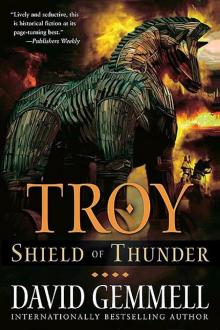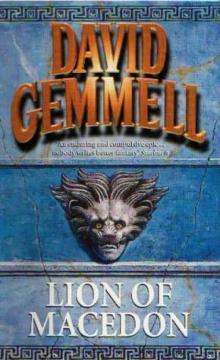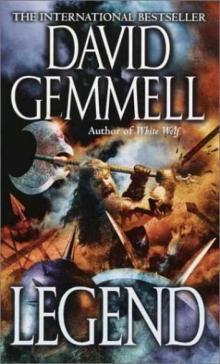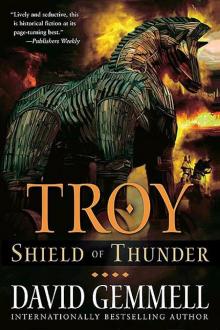- Home
- David Gemmell
Lord of the Silver Bow Page 41
Lord of the Silver Bow Read online
Page 41
Sweeping up her bow, Andromache noched another shaft to the string. She glanced down at Laodike, who had fallen to the floor and was trying to crawl toward the corridor, the long black spear still embedded in her back.
Other women ran past Andromache. All was pandemonium.
Then soldiers appeared from behind: Royal Eagles led by Helikaon. They surged into the Thrakians.
Andromache ran to where Laodike was crawling. Grabbing the spear, she tore it loose. Laodike cried out, then slumped down. Hurling the spear aside, Andromache tugged at Laodike’s arm, dragging her to her feet. “Lean on me,” she urged her. “We must get away from here.”
More Eagles ran into the fray. Andromache struggled on toward the double doors leading to the steps up to the queen’s apartments. Several Eagles were already there. One of them left his post and swept Laodike into his arms.
“Get her to safety,” ordered Andromache.
“There is nowhere safe tonight,” he said grimly. “But I’ll carry her upstairs. We’ll hold these doors as long as we can.”
IV
Helikaon and the Eagles battled their way into the gathering hall. The Trojans were all veterans and fought with ruthless efficiency. Well armored with shields and helmets, they drove the Thrakians back toward the double doors leading to the outer gates. The twenty defenders were heavily outnumbered, but the Thrakians, without shields and in their light city armor of leather breastplates and helmets, took terrible losses. Helikaon fought with cold fury, his two swords cutting and plunging with awesome speed.
The leading Thrakians fell back in disarray, then turned and ran into more of their comrades, who were still trying to force an entry. This led to a chaotic scene as panicking soldiers struggled to push their way through their own ranks. The Eagles rushed in, cleaving their swords into unprotected backs and necks. The Thrakians broke and streamed away from the double doors.
Helikaon yelled an order to the Eagles to pull back. Most obeyed him, but four men, battle lust having overtaken them, continued after the Thrakians. Back inside the gathering hall Helikaon ordered the double doors pushed shut. There were two wooden brackets for a locking bar, but the bar itself was nowhere in sight. It had not been needed for decades and obviously had been removed. Helikaon sent two Eagles in search of it. The sounds of fighting in the corridor beyond had ceased, and Helikaon guessed the Thrakians had turned on the four chasing Eagles. There was little time left to bar the doors. Soon the Thrakians would regroup.
“Gather up those spears,” he called out, pointing to the weapons of the dead Thrakians. The Eagles rushed to obey, and nine thick-shafted spears were wedged into the locking brackets.
“It will not hold for long,” said an Eagle.
Helikaon gazed around the hall. More than forty Thrakians had died there, but there were also the bodies of eight Eagles and five women, two of them elderly. Four more of the Eagles carried wounds.
“There is nothing more we can do here,” said Helikaon, and led them back to the second set of double doors, leading to the queen’s apartments and the king’s megaron. The locking bar had been found, and he ordered the heavy oak doors closed and barred.
Leaving two Eagles to watch the doors, he climbed the stairs to the queen’s apartments. In the largest of the rooms he found the surviving women. Some looked frightened, others shocked and uncertain. Laodike lay on a couch, flanked by Kassandra and Andromache. Blood had soaked the embroidered cloth beneath her. Sheathing his swords, Helikaon moved toward them.
A middle-aged woman stepped into his path. “What is happening?” she asked him, grabbing his arm. She was frightened and trembling, her face unnaturally pale.
“We are being attacked,” he told her, his voice calm. “There are wounded men who need aid. There will be more. Can you search the apartments for needles and thread and tear up linens for bandages?”
Her expression calmed. “Yes, I can do that.”
“Good. Organize the other women to tend to those who will need it.”
“Who is behind this treachery?” she asked.
“Agathon.”
She frowned and shook her head. “I always liked him,” she said.
“So did I.” Moving past her, he knelt by the couch. There was a great deal of blood, and Laodike seemed to be sleeping. He glanced at Andromache.
“A spear,” she whispered. “It took her low in the back. I have stopped the bleeding, and her heartbeat is strong. I think she will recover.”
Helikaon reached out and gently brushed a wisp of hair back from Laodike’s brow. Her eyes opened.
“Helikaon!” she cried with a wide smile. “Are the traitors slain?”
“Not yet.”
“They killed the priestess. It was dreadful. Were they drunk?”
“No, Laodike. There is a plot to kill your father.”
“Antiphones or Dios,” she said. “Or both.”
“No. Agathon.”
“Oh, no,” she whispered. “No, it cannot be true.”
“Sadly it is. He had Antiphones stabbed, and he has ordered the deaths of everyone inside the palace.”
“He and you were friends,” said Laodike. “I don’t understand. Is Argurios here?”
“Yes. He is down in the courtyard, organizing the defenses.”
“Defenses?” She seemed bemused.
“Agathon’s Thrakians have surrounded the palace, and there is a Mykene force coming to aid them.”
“What about our troops?”
“The soldiers inside the city are loyal to Agathon. It will be a long night, I think.”
Laodike sighed, then winced. “If feels as if I have been kicked by a horse,” she complained.
“Stab wounds are like that,” he told her. “And now I must go. You rest now and gather your strength.”
“Yes, I will. I am very tired. Tell Argurios to be careful. I don’t want anything to happen to him.”
“Argurios?” Helikaon glanced at her quizzically.
“We will be wed,” she said. “It is our destiny.”
Helikaon smiled and then leaned forward and kissed Laodike’s brow. “I am happy for you,” he told her. Then he stood. Andromache rose alongside him. “Walk with me a little way,” he said.
Moving through the apartment they emerged onto a gallery above a wide stairway leading down to the king’s megaron. Below they could see men arming themselves with weapons and shields from the walls.
“I am glad you came,” said Andromache.
Helikaon looked into her green eyes. “I came for you,” he said.
“Why?”
“I think you know.”
“Perhaps. But there may be little time left to hear the words.”
Taking her hand, he lifted it to his lips. He had expected the words to come haltingly, but they did not. “I love you, Andromache,” he said. “I have loved you since that first moment on the beach at Blue Owl Bay. You have been in my heart and my mind constantly since that night. If we survive here, will you come back to Dardania with me?”
“Yes,” she said simply.
He kissed her. As their lips met, all thoughts of peril vanished from his mind. Nothing else existed, and he knew that this exquisite moment would remain etched in his memory for the rest of his life.
As they finally drew back from each other, cold reality rushed in.
The rest of his life. It was likely to be no more than a single night.
“What are you thinking?” she whispered.
He smiled. “All my life I have been waiting for this moment, only I did not know it. I was thinking that I would rather be here now, standing with you, than anywhere else on the Great Green.”
XXXII
SPEARS IN THE NIGHT
I
With the gates closed and the initial burst of combat behind him, Argurios stood in the courtyard before the palace. On the walls above him some forty Eagles, armed with Phrygian bows, were waiting for the next attack. Behind him he could hear orders bei
ng shouted within the king’s megaron. Argurios stood silently, heavy of heart.
He had come there as a Mykene outlaw, determined to seek Priam’s permission to wed his daughter. Now he had been caught up in a civil war. The thought of battle did not disturb him. His whole adult life had been honed in combat. What troubled him, as he stood quietly in the calm before the onslaught, was that Mykene warriors were coming. If Agamemnon had agreed to support Agathon with a small force, it would be made up of the finest warriors of his army. Argurios would have fought beside most of them, celebrated victories with them, commiserated with them when mutual comrades fell. Faces swarmed before his mind’s eye: Kalliades the tall, Menides the spear carrier, Banokles the one-eared, Eruthros the joker, Ajax the skull splitter. . . .
Were they even now marching toward the citadel?
And if they were, how could he, as a Mykene warrior, take up arms against them?
Could he stab tall Kalliades and watch him fall? Could he send Banokles into the Underworld?
Yet these same men were coming to kill the father of the woman he loved. And what would be her fate if they succeeded? That was a question he could answer. Though Argurios himself had never raped a woman, he knew that such activity was common after a battle.
Anger built in him at the thought of such a fate for Laodike. No, I will not allow that, he decided. I would cut the heart from Agamemnon himself rather than see Laodike hurt.
Moving swiftly to the foot of the rampart, he climbed the twenty steps to where Polydorus was crouched down behind the crenellated wall. Argurios raised his head above the parapet, swiftly scanning the open ground beyond. There were no warriors in sight, though he could see men massing in the shadows of the narrow streets some eighty paces away.
“They will be seeking ladders,” said Argurios.
“They will find plenty of them,” replied Polydorus. “There is always new building work in Troy.”
The walls were no more than the height of two tall men. If the enemy set wagons against them, they would be able to leap from them and haul themselves over the battlements. Argurios glanced back at the palace. Above and to the left of the doors was a long balcony with high windows. Once the enemy opened the gates, they could bring their ladders to the palace walls and scale them, entering the building from above. With enough men Argurios could have held the outer walls for days. Similarly, with three hundred hardened warriors he could defend the palace against a horde. It was galling to have such a fortress and too few soldiers to keep it secure.
“I am going inside,” he told Polydorus. “I need to study the megaron and plan for its defense. If they attack before I return, loose several volleys into them and hold the first assault. That is vital.”
“We will hold, Argurios,” muttered Polydorus. “All night if we have to.”
“It will not be all night. I will explain more when I return.”
Polydorus smiled. “Something to tell my children when they grow up, eh? I fought beside Argurios.”
“You have children?”
“Not yet. But a man must think ahead.”
Argurios ran down the steps and across the courtyard. Inside the megaron all but the main doors had been barricaded. He saw Priam sitting on his throne, dressed in elaborate armor decorated with gold and silver, a high-crested helmet upon his lap. Everywhere there were armed men. They had almost stripped the walls of shields and spears. Alongside the king stood Prince Dios. He wore no armor, though a sword was belted by his side.
Argurios approached them. Priam looked up. “Have the dogs fled?” he asked, sober now, though his eyes were bloodshot and weary.
“No, Priam King. They are gathering ladders. They will come soon. We need archers on the outer balcony above the doors. Thirty should suffice. I will order the men on the walls to pull back to the megaron once the attack begins in earnest.”
“Who are you to give orders?” snapped Dios, his eyes angry.
“He is Argurios,” said Priam calmly. “He is fighting at my side.”
“We should put every man we have on the outer walls,” raged Dios. “We can hold them.”
“What say you to that, Argurios?” asked Priam.
“With three hundred men I would agree with Prince Dios. However, with so few the risk is encirclement. If they get behind us, we will be cut to pieces. We must keep a line of withdrawal secure for as long as possible. My plan is to hold the wall for the first attack, then quietly pull back. When they come again, we will hit them with volley after volley of arrows from the balcony.”
“And then we bar the doors?” asked Priam.
“No, King. We leave them open.”
Priam was surprised. “Explain that strategy,” he said.
“There are many ways for an enemy to come at us. There is the door to the palace gardens. They could bring their ladders and climb to the balcony. They can come through the rear. We want them attacking where we are strongest. The open doors will be an invitation they will not resist. They will be drawn to us like flies to horse shit, and we will hold them there. At least until the Mykene arrive.”
“By the fates, Father,” said Dios, “how can we trust this man? He, too, is Mykene.”
Argurios took a deep, calming breath. “Indeed I am, Prince. Believe me when I tell you I would rather be anywhere than here at this moment. If the Mykene succeed here, I will be killed along with all of you. Now we have little time to prepare and no time at all for personal feuds.” He turned to the king. “If you have a better man than I to command this defense, appoint him and I will stand and fight wherever called upon to do so.”
“I am the king,” Priam said coldly. “I will command my own defense. You think I am a weakling, some ancient unable to wield a sword?”
“It is not a question of your strength or your abilities,” answered Argurios. “If I were commanding the attackers, I would pray to all the gods that you would do exactly that. They win when you die. Every man among them will be seeking to kill you. Your armor shines like the sun, and every attack will home in on you. Every arrow, every spear, every sword will seek you. Your men will fight valiantly—but only so long as there is a king to fight for.”
At that moment Helikaon came through to the megaron and stood alongside Dios. “We have blocked the rear entrances,” he said, “but they will not hold long. What are your orders?”
Priam sat quietly for a moment. “Argurios advises that I withdraw myself from the fighting. What say you?”
“Sound advice. This fight will not just be about holding the palace but about defending you.”
“Let me take command in your stead, Father,” urged Dios.
Priam shook his head. “You have too little experience, and as Argurios says, there is no time for debate. The men will follow you, Aeneas. This I know. Equally, Argurios is known across the Great Green as a strategos and a fighting man. What is your opinion?”
“I have little experience of siege warfare and less of Mykene battle tactics,” said Helikaon. “I would follow the lead of Argurios.”
“Then let it be so.” Priam suddenly laughed. “A renegade Mykene in charge of the defense of my citadel? I like it. When we win, you can ask me anything. I will grant it. We are yours to command, Argurios.”
Argurios swung to Dios. “You will command the defense of the upper balconies. Take thirty good archers and also the men with the least armor. They will be protected from arrows by the balcony walls. The enemy will bring ladders. Hold them off as long as you can, then retreat to the megaron and we will pull back to the upper buildings at the rear.”
Dios, his face pale, his expression furious, was struggling to hold his temper.
“Do as he says,” snapped Priam.
“This is madness,” responded Dios. “But I will obey you, Father. As always.” With that he stalked away.
“Let us survey the battleground,” said Argurios, striding away through the megaron.
Priam and Helikaon followed him. Argurios reached the
foot of the stairs. They were wide enough for two warriors to fight side by side. Then he glanced up at the gallery above and to the right of the stairway. “We will have archers placed there. They will have a good view of the megaron itself. We need as many shafts as possible placed there. Spears and javelins, too, if we have enough. What is beyond the gallery?”
“The queen’s apartments,” said Priam. “They are large and spacious.”
Argurios strode up the stairs, Helikaon and Priam following him. In the queen’s apartments he saw Laodike on her bloodstained couch, Andromache sitting on the floor beside her. All thoughts of the defense fled from his mind. Pulling off his helmet, he moved to Laodike and took her hand. Her eyes opened, and she gave a wide smile. “What happened?” he asked her.
“I was wounded,” Laodike told him. “Do not concern yourself. It is nothing.” Reaching up, she stroked his face. “I am glad you are here. Have you spoken to Father?”
“Not yet. I cannot stay with you. There is much to be done. I will come back when I can. You rest now.” Kissing her hand, he rose and walked back to where the king and Helikaon waited. Only then did he see the shock on Priam’s face. Argurios moved past them and walked through to the rear stairs. Then he turned back and strode through the many apartments. “The balconies are largely inaccessible,” he said. “Therefore, the enemy will be forced to come at us through the megaron. I believe we can hold the Thrakians at the doors. The Mykene will be another matter.”
“We could retreat to the stairs,” said Helikaon.
“We will do that, but the timing is crucial,” answered Argurios, walking back to the gallery above the stairs. “We must keep their blood up, forcing them to come at us. We must not allow them time to stop and think. For if they do, they will realize that this gallery is the key to victory. Once inside the megaron all they need to do is bring in ladders and scale it. That way they would bypass the stairs and surround us.”

 Bloodstone
Bloodstone White Wolf
White Wolf Wolf in Shadow
Wolf in Shadow Last Sword of Power
Last Sword of Power Dark Moon
Dark Moon Hero in the Shadows
Hero in the Shadows Gemmell, David - Drenai 09 - Hero In The Shadows
Gemmell, David - Drenai 09 - Hero In The Shadows Waylander
Waylander Shield of Thunder
Shield of Thunder Stormrider Stormrider
Stormrider Stormrider Ghost King
Ghost King Legend
Legend Winter Warriors
Winter Warriors Fall of Kings
Fall of Kings The Swords of Night and Day
The Swords of Night and Day The King Beyond the Gate
The King Beyond the Gate Midnight Falcon
Midnight Falcon 02 - Shield of Thunder
02 - Shield of Thunder In the Realm of the Wolf
In the Realm of the Wolf Ravenheart
Ravenheart The First Chronicles of Druss the Legend
The First Chronicles of Druss the Legend Last Guardian
Last Guardian Stormrider
Stormrider The Hawk Eternal
The Hawk Eternal Lion of Macedon
Lion of Macedon The Legend of Deathwalker
The Legend of Deathwalker Knights of Dark Renown
Knights of Dark Renown Echoes of the Great Song
Echoes of the Great Song Lord of the Silver Bow
Lord of the Silver Bow Quest for Lost Heroes
Quest for Lost Heroes Sword in the Storm
Sword in the Storm Drenai Saga 01 - Legend
Drenai Saga 01 - Legend White Knight/Black Swan
White Knight/Black Swan![[Troy 02] - Shield of Thunder Read online](http://i1.bookreadfree.com/i/03/19/troy_02_-_shield_of_thunder_preview.jpg) [Troy 02] - Shield of Thunder
[Troy 02] - Shield of Thunder Lord of the Silver Bow t-1
Lord of the Silver Bow t-1 Shield of Thunder t-2
Shield of Thunder t-2 White Wolf: A Novel of Druss the Legend dt-10
White Wolf: A Novel of Druss the Legend dt-10 Drenai Saga 02 - The King Beyond the Gate
Drenai Saga 02 - The King Beyond the Gate Ironhand's Daughter
Ironhand's Daughter Gemmell, David - Drenai 06 - The First Chronicles of Druss the Legend
Gemmell, David - Drenai 06 - The First Chronicles of Druss the Legend The Last Guardian
The Last Guardian Hero in the Shadows: A Waylander the Slayer Novel
Hero in the Shadows: A Waylander the Slayer Novel The Legend of the Deathwalker
The Legend of the Deathwalker